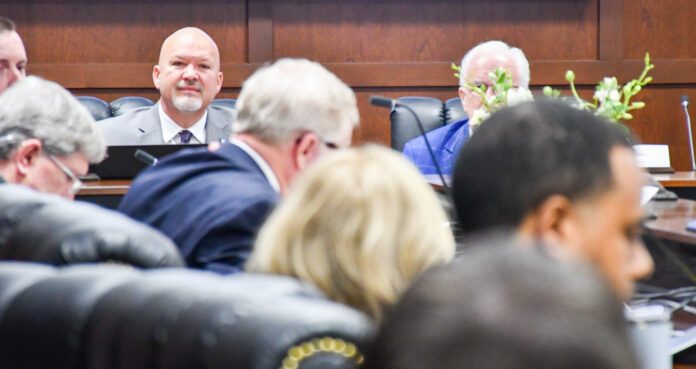More than 50 bills that would impact community colleges and postsecondary education have been filed by the General Assembly during this year’s legislative long session.
The Senate’s bill filing deadline was March 25, and the House extended its deadline from April 3 to April 10. Now, most bills must pass through one of the chambers by the crossover deadline on May 8 in order to continue being considered.
This year, the N.C. Community College System’s (NCCCS) primary legislative ask is to fund Propel NC, the system’s proposed funding model. Ahead of the bill filing deadlines, two bills were filed related to Propel NC: House Bill 490, Propel NC Funding and Tuition Surcharge, and House Bill 365, Workforce Education Act.
The NCCCS is asking lawmakers for nearly $100 million to implement Propel NC, a funding model the system says “prioritizes connecting students to high-demand, high-wage jobs.”
“The North Carolina Community College System’s budget priorities focus on modernizing and stabilizing funding for North Carolina’s community colleges to better align with workforce demands, economic growth, and operational needs,” the NCCCS legislative agenda says.
Here are the main funding asks included in the system’s Propel NC proposal:
- $68.5 million to shift the current full-time equivalent (FTE) funding tiers to “workforce sectors,” with courses ranked and valued by statewide salary job demand data every three years. All curriculum and continuing education (CE) courses would reside in the same workforce sector.
- $24.4 million to increase base allocation funds by approximately 5.8%, “which closes the gap to actual spending patterns and account for inflation,” per a 2024 NCCCS document.
- $6 million in non-recurring funds for an enrollment increase reserve to give a fixed per-FTE amount for any colleges that go over the enrollment threshold set by their FTE for the fiscal year. The system would then like to build replenishment of the fund into the recurring enrollment growth fund in the state budget.
Finally, Propel NC also includes a request that excess tuition receipts are returned to the college which generated them on years in which the system as a whole generates excess receipts. Currently, excess receipts fund the enrollment increase reserve.
HB 365, Workforce Education Act, was filed on March 11 with bipartisan support. The bill does not include the phrase “Propel NC,” but “would direct the State Board of Community Colleges to revise its funding model for community colleges and establish enrollment increase reserve.” The bill would fully fund the system’s request, with $94 million in recurring funds and $6 million nonrecurring to establish the enrollment growth reserve.
Under the bill, allocations for the revised funding formula would begin with the 2025-26 fiscal year.
Here’s a look at what the bill says about the formula revisions:
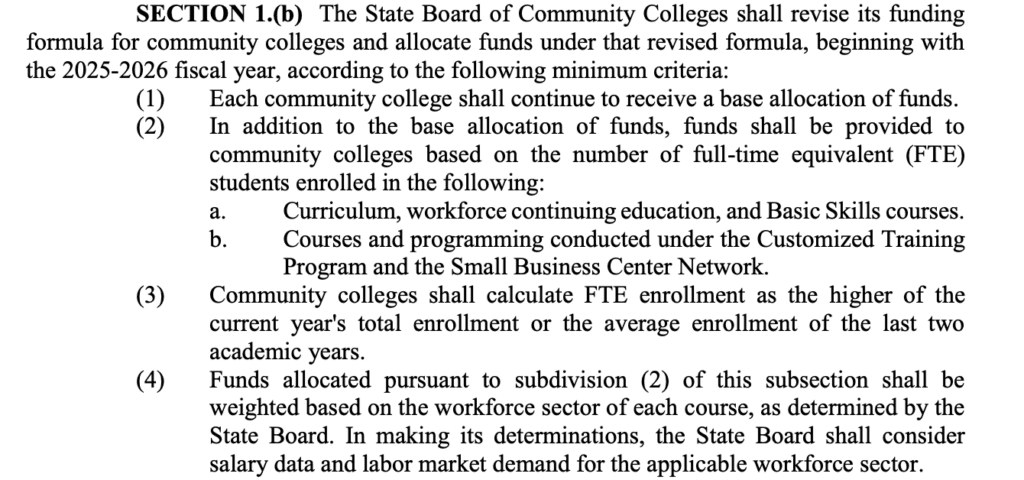
In addition to provisions regarding Propel NC, the bill would also expand funding for Cooperative Innovative High Schools and create grant programs for the Department of Public Instruction (DPI) to promote Career and Technical Education (CTE) programs and community college enrollment to public school students.
HB 490, Propel NC Funding and Tuition Surcharge, was filed with bipartisan support on March 24. The bill would “direct the State Board of Community Colleges to revise its funding model for community colleges to align with the Propel NC funding model.” It would also establish the enrollment increase reserve and allow colleges to establish a local tuition and fee surcharge.
HB 490 also says that allocations for the revised funding formula would begin with the 2025-26 fiscal year and would fully fund the system’s request for Propel NC. Unlike HB 365, this bill would require the system to submit a report to the General Assembly by April 1, 2027 on the revisions to its funding formula.
Both bills related to Propel NC must be discussed by the House appropriations committee in order to move forward. So far, neither bill has been added to the committee’s calendar.
Last short session, budget proposals from both chambers included $18.5 million in funding for the first phase of Propel NC, but no compromise budget was passed before lawmakers adjourned the session. In the proposals, that funding was for “funding model workforce parity.”
Apart from Propel NC, here’s a look at other bills that could impact the postsecondary space if passed by lawmakers this long session.
Read more about Propel NC
Dual enrollment and apprenticeships
In recent years, the General Assembly and NCCCS have both tried to expand workforce and dual enrollment opportunities across the state’s community colleges.
This session, there are several bills related to dual enrollment and apprenticeships.
House Bill 378, Leon’s Law (Dual Enrollment Info Parents), would require community colleges to share education information and records with the parents of dually enrolled students.
The bill is named in memory of Leon Gu, a 17-year-old student who died by suicide in 2020. Gu, who was dually enrolled at Wake Technical Community College, died days after receiving a letter from Wake Tech about an academic violation that could have jeopardized his acceptance to Duke University, according to a report by NC Newsline.
His parents, who did not know about the letter before their son died, are now advocating for HB 378, saying that parents of minors should have automatic access to their children’s educational records, which include information like grades, attendance, and disciplinary records.
The bill would require colleges to adopt a policy starting in the 2025-26 school year that automatically shares educational records of students below the age of 18 who are dependents. Parents can opt out of receiving the records under the bill.
“For the purposes of this section, ‘parent’ is defined as the parent, guardian, or an individual acting as a parent in the absence of a parent or guardian of a student,” the bill says.
Senate Bill 223, Expand Academic Trans. Pathways/Sophomore HS, “would expand academic transition pathways for sophomore high school students.” Currently, state law only requires community colleges to offer dual enrollment programs to juniors or seniors, although some colleges also offer courses to sophomores.
The Senate passed SB 223 on March 12.
House Bill 670, Workforce Credential Grant Program/CCP would establish a Career and College Pathways Innovation Challenge Grant Program. The program would develop local and regional partnerships to increase postsecondary attainment, “ensure alignment between educational options provided and labor market needs,” and “eliminate educational opportunity gaps where they exist.”
House Bill 414, 1-to-1 Credit for Career and College Promise, would “give equal credit to community college and high school courses taken by Career and College Promise students.”
“The State Board of Community Colleges shall collaborate with the State Board of Education to develop a series of courses to be offered at community colleges that align with the English, science, social studies, and mathematics graduation requirements developed by the State Board of Education to be attended by high school students dually enrolled in a community college and other community college students. The courses shall be organized so that one community college course completion grants one full high school credit to fulfill a corresponding graduation requirement while continuing to align with Career and College Promise. Completion of courses developed pursuant to this subsection does not constitute a completion of any end-of-course tests required to graduate.”
HB 414
If passed, the bill would become effective when it becomes law.
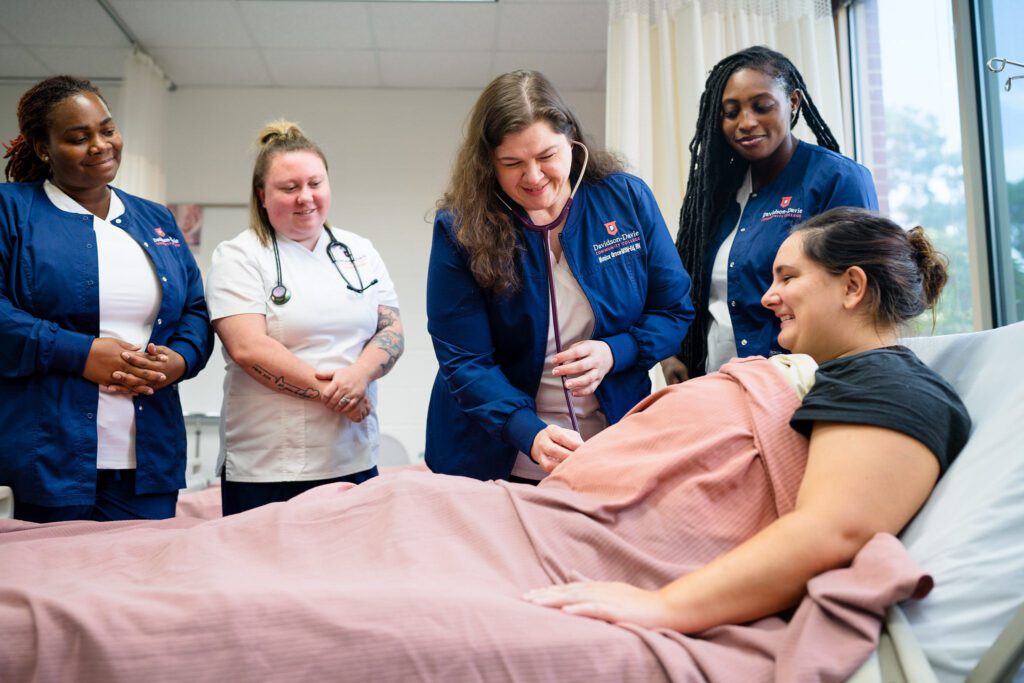

Senate Bill 240, Establish NCSTARS Grant Program, which was introduced with bipartisan support, would establish “the North Carolina strategic training and reliable skills grant program to increase engagement in apprenticeship and preapprenticeship programs.”
The bill would establish the North Carolina Strategic Training And Reliable Skills Grant Program (NCSTARS) for the 2026-27 through 2028-29 academic years.
“The purpose of NCSTARS is to provide matching grants to community colleges that partner with nearby public school units and local business partners to develop a regional, work-based learning program to provide opportunities to learn and reinforce key skills for postsecondary opportunities, including apprenticeships and preapprenticeships, to students age 16 and older that are eligible for work-based learning according to the Department of Public Instruction,” the bill says.
If passed, the NCCCS would work with Surry-Yadkin Works during the 2025-26 school year to create an application for the program. Each participating college could receive grants up to $500,000 per year, with the system office “providing matching funds in the amount of $3 for every $1.”
Finally, Senate Bill 579, Transforming the High School Experience, would “establish the North Carolina High School Redesign Commission, to establish various competency-based learning programs, and appropriate funds for those purposes.”
The commission would have 15 members, including the president of the NCCCS and DPI, or their designees.
“The purpose of the Commission is to explore and recommend changes to policies and systems governing high school and higher education that will better prepare North Carolina students for success as they transition to higher education or the workforce,” the bill says.
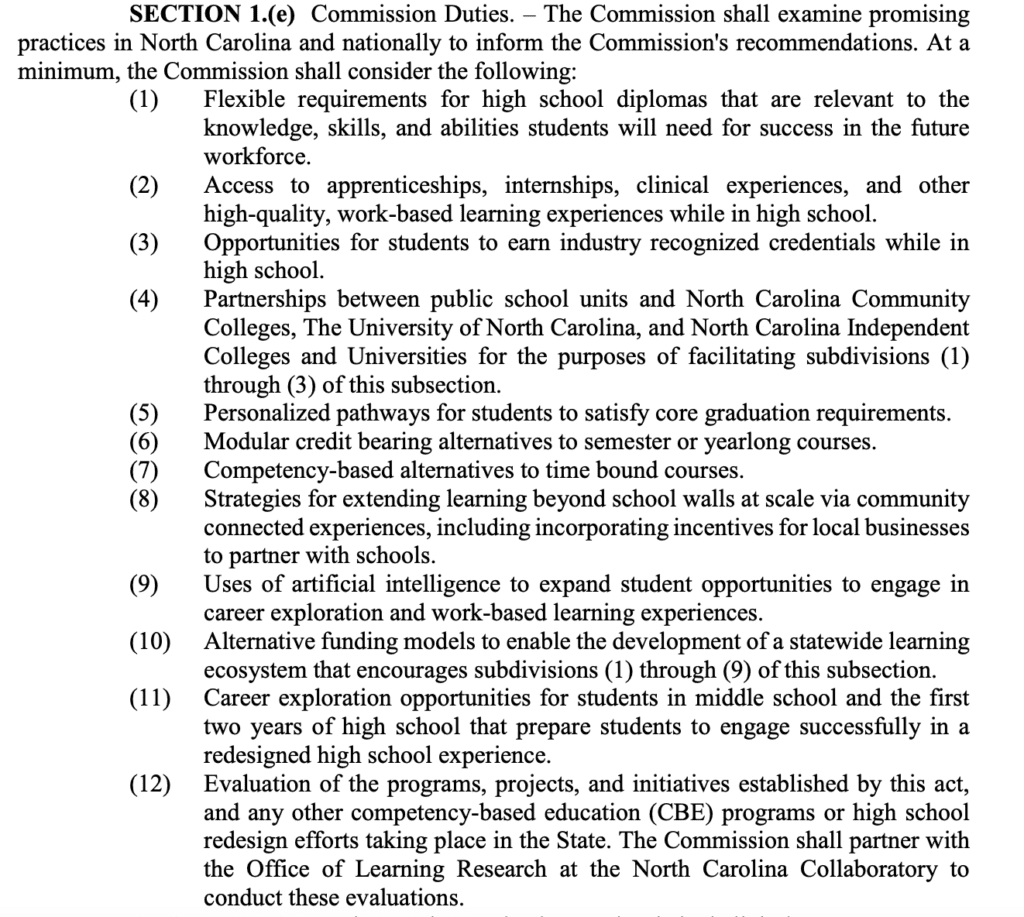
The bill would also create the Community College Seamless Skills Initiative, to “create a competency-based education (CBE) model that seamlessly connects high school and community college.”
According to the bill, this alignment would allow high schoolers to “explore career pathways, earn dual credit, and fulfill computer science requirements while gaining credentials of value in high-demand technology employment sectors through college credit.”
Fayetteville Technical and Wilkes community colleges would partner to implement the initiative, the bill says.
SB 579 would also establish a Competency-Based Education and High School Redesign Strategic Network, to include the Mooresville Graded School District, Wake County Public Schools, SparkNC, and Mitchell, Wake Tech, Fayetteville Tech, and Wilkes community colleges.
“The Network shall provide a means for each entity to share what it has learned and developed regarding CBE and high school redesign,” the bill says. “The goals of the Network shall be to advance the goals of developing a CBE approach to education across the State.”
The bill was filed with bipartisan support on March 25. You can read the full bill here.
A similar bill, House Bill 596, Standard Advisory Commission, would create the Standards Course of Study Advisory Commission to recommend academic standards to the State Board of Education for approval.
That commission would include six appointees each from the Senate, House, and governor, along with the state Superintendent, NCCCS president, UNC System president, and president of the NC Chamber.
The presidents of the NCCCS, UNC System, and NC Chamber would be nonvoting members. House and Senate appointees would include educators from across the state.
The bill says that if the state Board “fails to adopt the Commission’s original and amended recommendations… the Board may develop its own recommended standard course of study.” Currently, DPI makes curriculum recommendations to the Board.
Child care bills
Lawmakers also filed two bills this session related to child care and community colleges.
The first, House Bill 316, Child Care Act, includes funds for public child care provided by community colleges, among other things.
The bill would appropriate $10 million for the 2025-26 fiscal year to be allocated “among community colleges with an active child care program that is available to the public to support and maintain that program.”
Under the bill, any community college without a child care program would have to report “on the feasibility and advisability of implementing a publicly available child care program at that community college, including recommendations for implementing such a child care program, estimated costs, and barriers to implementation,” to give to the General Assembly no later than March 31, 2026.
It also mandates a report on the feasibility of establishing a high school child care apprenticeship program.
House Bill 389, Child Care Workforce Pilot Program, would require the NCCCS and the North Carolina Partnership for Children to establish a two-year child care academy pilot in 10 counties, along with Johnston and Wayne counties, some of the model’s early adopters.
“The pilot program shall establish child care workforce academies across the State designed to provide free, comprehensive training and support to individuals, with no experience or education in child care, who are interested in pursuing a career in child care,” the bill says.
According to the bill, the NCCCS would ensure the appropriate content is included in the academies for the graduates to receive the NC Early Childhood Credential, which is required to be a lead teacher. Academies would last two to three weeks, for up to eight hours a day.
The House passed HB 389 last week.
You can read more about the academies, along with other child care bills, in the article below.
Eliminating DEI
On Jan. 20, President Donald Trump signed the executive order, “Ending Radical And Wasteful Government DEI Programs And Preferencing.” Among other things, the order directed all federal offices and departments to terminate diversity, equity, and inclusion (DEI) “positions, committees, programs, services, activities, budgets, and expenditures.”
The order does not technically extend to states, but the order does extend to federal government grantees, which includes many North Carolinian organizations. Trump and the Department of Education has since said they will remove federal funding for state education offices that “use race preferences and stereotypes as a factor in their admissions, hiring, promotion, compensation, scholarships, prizes, administrative support, sanctions, discipline, and beyond.”
North Carolina Republican lawmakers filed several bills prohibiting DEI policies in state government and across the education continuum.
“North Carolinians deserve a state government that works for them,” said Rep. John Torbett, R-Gaston, said in a a Jan. 24 press release. “Unfortunately, our government agencies and public universities have been bogged down by bad policies and programs, like DEI, limiting their ability to enact their core purpose: serving citizens.”
Senate Bill 558, Eliminating “DEI” in Public Higher Ed, was filed by Republicans on March 25 and passed the Senate on April 9. It must now be passed by the House.
The bill says it is “an act to demonstrate the General Assembly’s intent that students, professors, administrators, and other employees of public institutions of higher education recognize the equality and rights of all persons and to prohibit public institutions of higher education from promoting certain concepts that are contrary to that intent.”
Here is a look at how the bill defines what it calls “divisive concepts:”
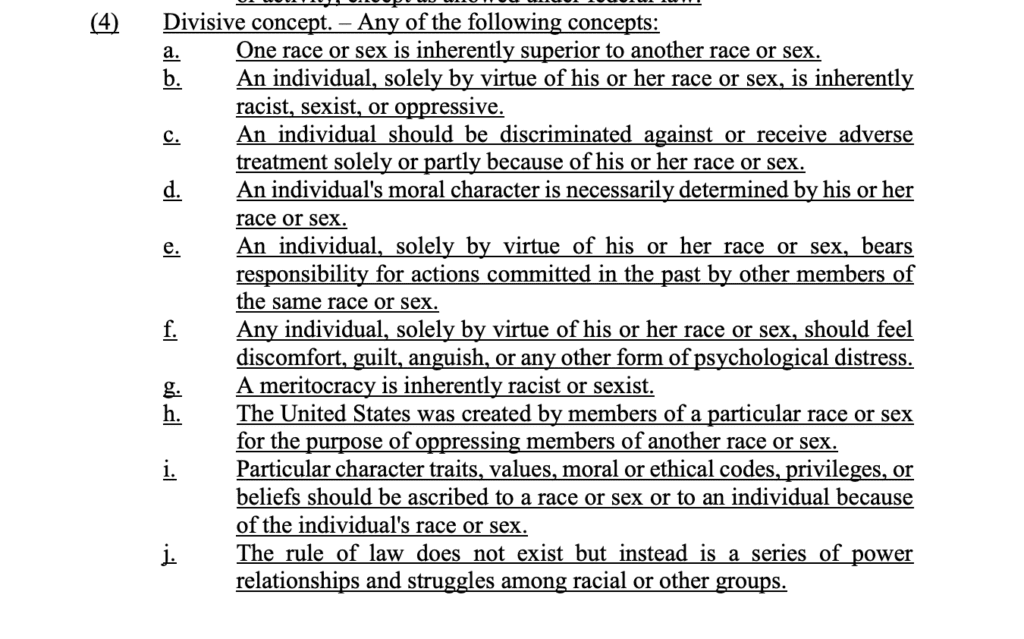

SB 558 says public institutions of higher education “shall not do any of the following:”
- Engage in or advocate for discriminatory practices.
- Compel students, professors, administrators, or other employees to affirm or profess belief in divisive concepts.
- Endorse divisive concepts.
- Maintain an office, division, or other unit (i) promoting discriminatory practices or divisive concepts or (ii) referred to as or named diversity, equity, and inclusion.
- Employ or assign an employee whose duties for a public institution of higher education include promoting discriminatory practices or divisive concepts.
- Require completion of a course related to divisive concepts for purposes of awarding a degree or completion of a program.
The bill would also require every public college or universe to “certify annually in writing by September 1 to the applicable governing board that the public institution of higher education fully complies with the requirements of this section, including any actions taken to achieve compliance.”
At that point, each governing board would be required to summarize the certifications in a report to the General Assembly by January each year.
A similar bill also passed the Senate for the public K-12 system last month.
LMS, voter ID, and more
Here’s a look at other postsecondary bills we’re watching:
- Senate Bill 133, NCCCS Learning Management system, would allow NCCCS to solicit a Learning Management System (LMS) for all community colleges. Currently community colleges across the system can each select their own LMS.
- Senate Bill 715, Student Voter ID Grant Program/CCs, would appropriate funds for the State Board of Community Colleges to establish a student voter identification program and encourage community colleges to apply for the grants.
- One provision of House Bill 977, Defend NC, would require a statewide study and reports from the State Board of Education and State Board of Community Colleges “on federal funds provided for education that have been eliminated by the federal Department of Government Efficiency and any actions that have already been taken or that need to be taken to replace those funds or, if the funds cannot be replaced, to achieve the same purposes for which those funds were provided.”
- House Bill 89, University Vaccination Freedom Act, would “repeal immunization requirements for persons who attend a college or university in North Carolina.”
- House Bill 7/Senate Bill 300, NC REACH Act, would require at least 3 credit hours in American history/government to graduate from the UNC System or NCCCS. The bill lays out various requirements to graduate with both bachelor and associate degrees.
- House Bill 957, HBCU/HMSI Omnibus, would “appropriate funds and make various changes to laws to support public and private historically black colleges and universities and historically minority-serving institutions in North Carolina.”
- Senate Bill 508, LL to CPL/Apprenticeship Program, would “provide a pathway to a continuing professional license for teachers teaching under a limited license… establish the teacher apprenticeship program… repurpose funds from the teacher apprentice grant program for the teacher apprenticeship program, and require the Board of Governors of the University of North Carolina and the State Board of Community Colleges to develop an expedited teacher pipeline pathway.”
- Senate Bill 691, In-State Tuition Equity, would grant in-state tuition at UNC System institutions and North Carolina community colleges to certain immigrants without legal status. House Bill 667, Reduce Barriers to College Completion, would provide in-state tuition “for certain children of lawfully admitted or lawfully present noncitizens.”
- House Bill 772, North Carolina Student Lifeline Act, would “require schools to share the suicide and crisis lifeline phone number in various ways.” This bill would apply to traditional public schools, charter schools, and community colleges.
What did we miss? Email me at hmcclellan@ednc.org.


